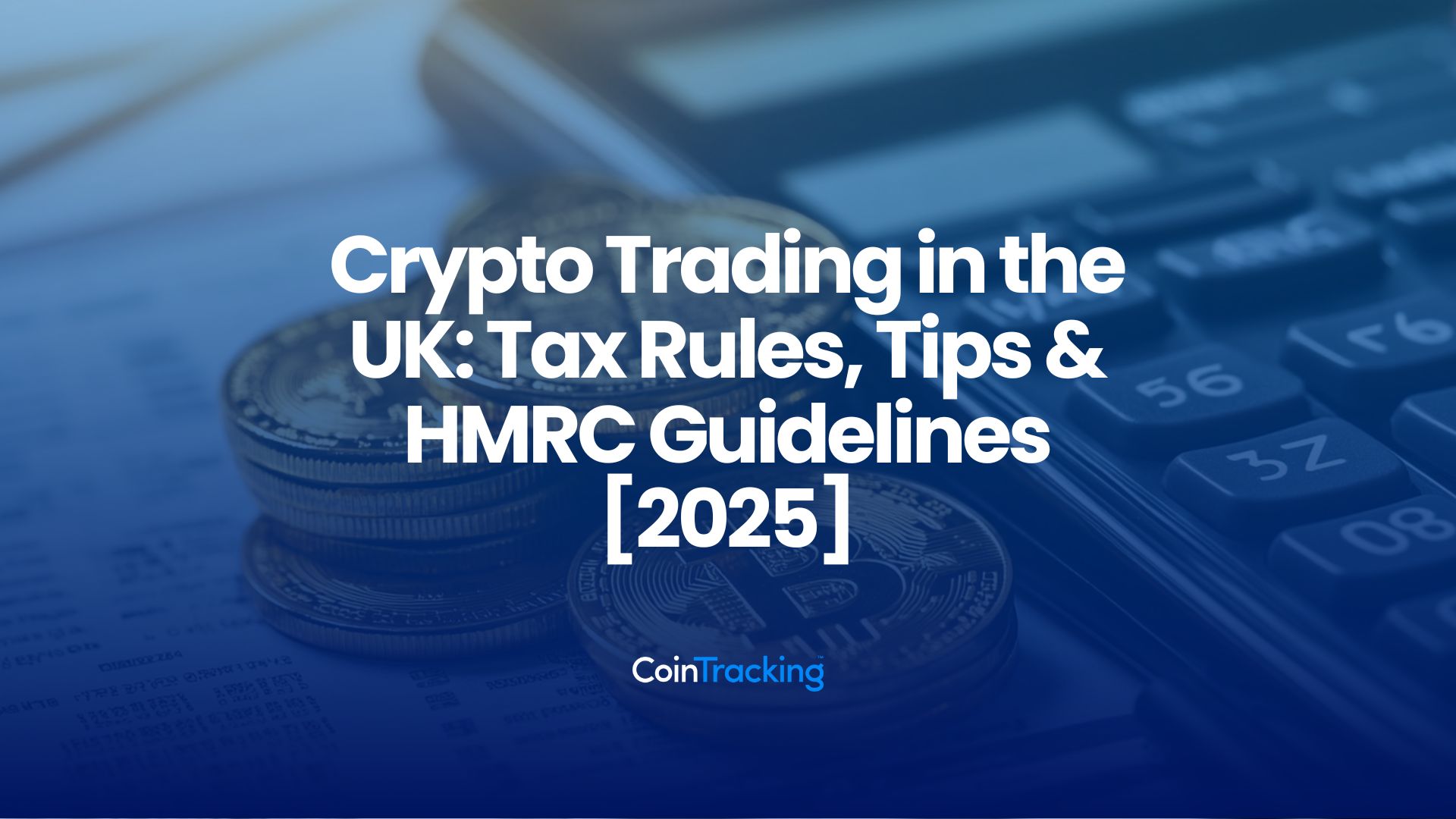Crypto trading in the UK is fully taxable, but the type of tax you pay depends on how HMRC views your activity. For most people, frequent buying and selling of crypto is taxed under Capital Gains Tax (CGT) rules, while only a small number of cases are treated as trading income.
Understanding the difference and knowing how to calculate your gains is essential to staying compliant and avoiding penalties. If you are new to these rules, start with our comprehensive UK crypto tax guide for the full picture. This article focuses on how crypto trading is taxed in 2025 and the steps you can take to reduce your bill legally.
Key Takeaways for Crypto Traders in the UK
- HMRC taxes most crypto trades under CGT, not Income Tax
- Frequent trading can still be taxed as income if it meets HMRC’s trading criteria
- Every taxable trade must be reported, including swaps between coins
- Losses from trading can be offset against future gains if properly claimed
- Using a tool like CoinTracking can save time and automatically applies HMRC’s matching and pooling rules
What is Crypto Trading?
Crypto trading is the practice of buying and selling cryptocurrencies with the aim of making a profit from changes in their value. This can be done through direct spot trading, using crypto derivatives such as futures and options, or participating in markets for digital collectibles like NFTs.
Trading styles vary. Some traders focus on short-term market moves, while others take a more strategic approach over longer periods. A smaller group conducts trading in a highly organised and regular way that resembles running a business.
Is Crypto Trading Taxable in the UK?
Yes. Crypto trading is taxable because HMRC treats cryptocurrencies as capital assets rather than currency. This means that whenever you dispose of crypto, you may need to pay tax. A disposal happens when you:
- Sell crypto for pounds or another fiat currency
- Swap one cryptocurrency for another
- Trade crypto for an NFT or other digital asset
- Spend crypto on goods or services
- Gift crypto to someone other than your spouse or civil partner
Most traders will pay Capital Gains Tax (CGT) on profits from these disposals. Only in rare cases where HMRC considers you to be operating as a business will the profits be taxed as trading income under Income Tax rules.
How HMRC Defines Crypto Trading in the UK
HMRC makes a clear distinction between investing in crypto and trading crypto as a business. Most people who buy and sell crypto, even frequently, are treated as investors for tax purposes and pay Capital Gains Tax (CGT) on their profits.
To decide if you are a trader rather than an investor, HMRC uses the same tests that apply to other assets, such as shares. These include:
- The frequency of your transactions
- The level of organisation in your activity, such as keeping business-like records or having a formal trading strategy
- The intention to profit as part of a commercial operation rather than personal investing
If HMRC decides you are trading as a business, your profits are taxed as income rather than capital gains. This means they are subject to Income Tax and National Insurance contributions, but you may also be able to deduct a wider range of expenses.
Capital Gains vs. Income Tax on Crypto Trading
In the UK, profits from crypto trading are taxed in one of two ways depending on whether HMRC sees you as an investor or a trader:
- Capital Gains Tax (CGT) applies to most people. You pay CGT when you make a profit from disposing of crypto, and you can use your annual CGT allowance (£3,000 for 2025-26) to reduce the taxable amount. Losses can be carried forward to offset future gains.
- Income Tax applies if HMRC classifies your activity as running a trading business. In this case, your profits are added to your other income for the year and taxed at your personal Income Tax rate. National Insurance contributions may also apply.
Related reading: For more insights on general crypto taxation beyond trading, see our detailed guide on crypto taxes in the UK.
All Crypto Investments at a Glance
Example 1: Trading as a Private Person (Same-Day Rule)
Explanation: This trade is matched under HMRC’s same-day rule, which pairs sales with purchases made on the same date before looking at older holdings. The gain of £1,000 is added to other gains for the year and taxed under CGT rules if the total gains exceed the allowance.
Example 2: Trading as a Private Person (30-Day Rule)
Explanation: This trade is matched under HMRC’s 30-day rule, which pairs sales with purchases made within 30 days before looking at older holdings. The gain of £500 is added to other gains for the year and taxed under CGT rules if the total gains exceed the allowance. This rule prevents “bed and breakfasting” to create tax losses.
Example 3: Trading as a Private Person (Section 104 Pool)
Explanation: Neither the same-day nor the 30-day rule applies, so HMRC uses the Section 104 pooling rule. The pool takes the average cost of all your BTC in the same group:
(£15,000 + £18,000 + £21,000) ÷ 3 = £18,000
When you sell from the pool, the gain or loss is based on the sale price minus the average cost, resulting in a gain of £2,000 in this example. The gain is added to other gains for the year and taxed under CGT rules.
Which matching rule applies to each disposal can significantly change your gain or loss. Our Crypto Holding Period in the UK guide explains same-day, 30-day, and Section 104 pooling in detail.
Example 4: Trading as a Business
Explanation: HMRC determines that the activity qualifies as trading as a business. The £25,000 profit is taxed as income along with other earnings for the year, and National Insurance may apply. Allowable business expenses can be deducted from the trading profits.
For complex trading activity like this, the CoinTracking Full-Service can assist in reviewing and preparing the records so that they meet HMRC requirements.
Capital Gains Tax Rates for Crypto Trading in the UK
If HMRC treats your crypto trading profits as capital gains, the amount of tax you pay depends on your total taxable income for the year. CGT is charged on the portion of your gains that exceed your annual tax-free allowance of £3,000 for the 2025-26 tax year.
CGT rates for individuals in 2025-26:
How to Legally Reduce Your Crypto Trading Taxes in the UK
There are several ways to minimise your crypto trading tax bill without breaking the rules. HMRC allows certain reliefs, exemptions, and planning strategies that can reduce the amount you owe.
1. Use your annual CGT allowance
You can make up to £3,000 in gains this tax year (2025-26) without paying CGT. If you are close to the limit, consider spreading disposals over two tax years.
2. Offset your losses
If you sell crypto at a loss, report it to HMRC so you can offset it against gains. Losses can also be carried forward indefinitely if you claim them in time.
3. Plan around the matching rules
Be aware of the same-day and 30-day rules, as they can affect your gains. Avoid quick repurchases that may trigger an unwanted tax bill. See our Crypto Holding Period in the UK guide for more details.
4. Gift to your spouse or civil partner
Transfers between spouses or civil partners are tax-free and keep the original cost basis. This can be used to make the most of two annual CGT allowances.
5. Consider tax-advantaged investments
While you cannot hold crypto directly in an ISA or pension, you can use these accounts for other investments to reduce overall taxable income.
6. Keep accurate records
Accurate tracking is essential for calculating gains and proving your figures to HMRC. CoinTracking applies HMRC’s rules automatically and keeps a full history of your trades. For more complex cases, the CoinTracking Full-Service can prepare your crypto tax reports for you.
Your Tax Declaration – With one Click
FAQ about Crypto Trading Taxes in the UK
Do I have to pay tax on every crypto trade?
Yes, if the trade counts as a disposal under HMRC rules. This includes selling for fiat, swapping one crypto for another, or trading for NFTs.
How does HMRC classify me as a crypto trader?
HMRC looks at frequency, organisation, and intent to profit. Most people are taxed as investors under CGT rules. Only a small number qualify as trading as a business, in which case Income Tax applies. See How HMRC Defines Crypto Trading.
Can I offset losses from crypto trading?
Yes. You can use losses to offset gains in the same year or carry them forward to reduce future gains. You must report the losses to HMRC in the tax year they occur.
What happens if I don’t report my crypto trades?
Not reporting taxable crypto activity can lead to penalties and interest on unpaid tax. HMRC has data-sharing agreements with major exchanges, and non-reporting is illegal.
How does the holding period affect my taxes?
Holding period rules determine which coins HMRC treats as sold and at what cost basis. The same-day, 30-day, and Section 104 pooling rules apply.
Conclusion: Stay Compliant with HMRC and Maximize Your Profits
Crypto trading in the UK is taxable for most people under Capital Gains Tax. Using your CGT allowance, offsetting losses, and planning trades can help reduce your bill. CoinTracking applies HMRC’s rules automatically, keeps a full history of your trades, and generates reports that make filing with HMRC much easier.
Disclaimer
The information provided in this article is for educational and informational purposes only. It is not intended as financial, investment, tax, or legal advice. Cryptocurrency investments are highly volatile and carry significant risks. Before investing in cryptocurrencies, conduct thorough research, consult with a financial advisor, and ensure you understand the risks involved. The author and publisher are not responsible for any financial losses or damages that may occur from following the information presented in this article. Always use caution and make informed decisions when dealing with cryptocurrencies.






